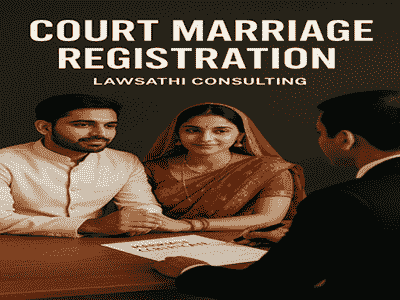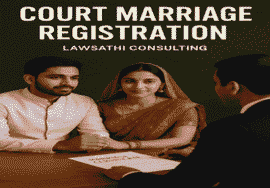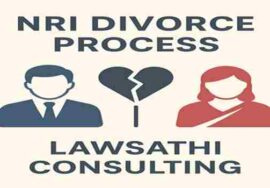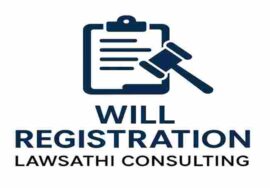
NRI Court Marriage Registration in Delhi under SMA
NRI Court Marriage Registration in Delhi under the Special Marriage Act, 1954
The Special Marriage Act, 1954, provides a secular legal framework for marriages between individuals of different religions, castes, or nationalities, including Non-Resident Indians (NRIs). If one or both partners are NRIs, they can solemnize and register their marriage in Delhi through a court marriage, provided they meet the eligibility and residency requirements. This process ensures that the marriage is legally valid both in India and abroad. NRI court marriage in Delhi.
About Marriage
Marriage, therefore, stands as a universally recognized social institution that not only formalizes the partnership between two individuals but also binds them through a legal, religious, or social contract. Moreover, it creates a framework of mutual obligations, shared rights, and common resources, thereby serving as the foundational base for building a family. We can also say marriage is devotion to each other.
💍 What is a Court Marriage?
A court marriage is a lawful marriage solemnized before a Marriage Officer under the Special Marriage Act, 1954.
It does not require religious rituals or ceremonies. Instead, the couple declares their intention to marry and signs the official register before the Marriage Officer and three witnesses.
This process ensures legal recognition of marriage across India and internationally for NRIs. NRI court marriage in Delhi.
⚖️ Procedure of NRI Court Marriage in Delhi
The procedure for court marriage registration for NRIs under the Special Marriage Act, 1954 involves the following legal steps:
Step 1: Notice of Intended Marriage
The NRI couple (or one Indian partner and one NRI partner) must submit a written notice to the Marriage Officer (SDM) of the district where at least one partner has resided for 30 days.
If one partner lives abroad, they can submit the notice to the Indian Embassy or Consulate, which forwards it to the Marriage Officer in Delhi.
Step 2: Publication of Notice
The Marriage Officer displays the notice publicly for 30 days.
This step allows anyone to raise a legal objection under Section 7 of the Special Marriage Act, 1954.
If no one objects within this period, the Officer proceeds with the registration.
Step 3: Objection Hearing (if any)
If an objection arises, the Marriage Officer conducts an inquiry within 30 days to verify its validity.
If the Officer finds the objection invalid, the marriage can proceed.
Step 4: Declaration and Marriage
After the 30-day notice period, both parties must appear in person before the Marriage Officer along with three witnesses.
They sign a declaration in the prescribed form confirming their free consent to the marriage.
The Marriage Officer then solemnizes the marriage by reading out the declaration and obtaining signatures.
Step 5: Issuance of Marriage Certificate
Once solemnized, the Marriage Officer issues the Marriage Certificate, which serves as legal proof of marriage in India and is recognized by foreign authorities.
🧾 Eligibility Criteria for NRI Court Marriage in Delhi
Before applying for NRI court marriage, the couple must satisfy the following conditions under Section 4 of the Special Marriage Act, 1954:
Age:
Groom must be 21 years or older.
Bride must be 18 years or older.
Marital Status:
Neither party should have a living spouse.
Mental Capacity:
Both must be of sound mind and capable of giving valid consent.
Prohibited Relationship of the Marring couple:
They must not be related to each other within prohibited degrees of relationship, unless their personal law allows it.
Residency of Marring Person:
At least one partner must have resided in Delhi for 30 consecutive days before the filing of the notice.
For NRIs, a residential proof of address in India or abroad must be provided.
📋 Required Documents for NRI Court Marriage Registration in Delhi
Both parties must present original documents with self-attested photocopies.
For Both Partners
Valid Passport and Visa (for NRIs)
Address proof (Aadhaar, passport, driving licence, or foreign address proof)
Age proof (Birth certificate, Passport, or school certificate)
Passport-sized photographs (4 – 6 each)
Affidavit stating nationality, marital status, and date of birth
Residential proof showing a 30-day stay in Delhi or embassy attestation
No Objection Certificate (NOC) from the foreign country (for NRI partner)
Divorce decree or death certificate (if previously married)
For Witnesses (Three)
Passport-size photographs
Valid ID proof (Aadhaar, Voter ID, or Passport)
Address proof
⏱️ Time Required for NRI Court Marriage Registration in Delhi
The entire process usually takes around 30 to 45 days or depands on complexity of case, including the mandatory 30-day public notice period.
If there are no objections or document discrepancies, registration is completed on the scheduled date.
💰 Fees for NRI Court Marriage in Delhi
The government registration fee under the Special Marriage Act, 1954 is typically between ₹500 and ₹1,500.
If you engage a lawyer for NRI court marriage, total professional charges (including affidavit, notary, document attestation, and representation), or depending on complexity and embassy involvement.
🌍 Advantages of Court Marriage for NRIs
Provides legal recognition in India and abroad
Ensures validity of marriage certificate for visa, immigration, and foreign residency purposes
Offers protection of marital rights under Indian law
Prevents complications of interfaith or intercaste marriages
Simple, transparent, and legally binding procedure
📚 Conclusion
The NRI Court Marriage Registration in Delhi under the Special Marriage Act, 1954 offers a lawful, secular, and globally recognized way for couples to solemnize their marriage.
By following the correct documentation and procedure, couples can ensure their marriage stands valid in both India and the foreign jurisdiction where they reside.
Hiring an experienced NRI marriage registration lawyer in Delhi ensures accuracy, timely registration, and legal compliance with embassy and government requirements.
❓ Frequently Asked Questions (FAQs)
Q1. Can an NRI get married to an Indian in Delhi under the Special Marriage Act?
Yes. The marriage can be solemnized in Delhi if at least one partner has resided in India for 30 days before filing the notice.
Q2. Is the marriage certificate issued in Delhi valid abroad?
Yes. Consequently, the certificate issued under the Special Marriage Act, 1954, holds legal validity worldwide and is accepted for visa and immigration purposes.
Q3. Can the notice period of 30 days be waived?
No. The 30-day public notice is mandatory under Section 5 of the Act and cannot be waived.
Q4. Can an NRI authorize someone to complete the process in India?
The couple must appear in person for solemnization.
Q5. Why should I hire a lawyer for NRI court marriage registration?
A lawyer helps with document preparation, verification, embassy coordination, and ensures the process complies with both Indian and international requirements.
Other Keywords
NRI court marriage registration in Delhi, Special Marriage Act 1954, NRI marriage registration Delhi, court marriage process for NRI, NRI marriage certificate India, court marriage lawyer in Delhi, interreligious marriage registration, legal NRI marriage India.
Disclaimer: This article is for educational and informational purposes only. It provides a general understanding of legal remedies but does not constitute legal advice. For specific legal guidance, you can consult a legal expert.







